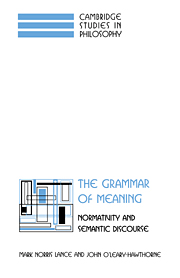Book contents
- Frontmatter
- Contents
- Acknowledgments
- Introduction
- PART I THE PLACE OF MEANING TALK IN SOCIO-LINGUISTIC PRACTICE
- PART II NATURALISM AND MEANING TALK
- 4 The epistemology of meaning and the analysis of meaning
- 5 Robust meaning theories and canonical dispositions
- 6 Reduction and naturalism
- 7 Realism and factuality
- Bibliography
- Index
5 - Robust meaning theories and canonical dispositions
Published online by Cambridge University Press: 05 December 2011
- Frontmatter
- Contents
- Acknowledgments
- Introduction
- PART I THE PLACE OF MEANING TALK IN SOCIO-LINGUISTIC PRACTICE
- PART II NATURALISM AND MEANING TALK
- 4 The epistemology of meaning and the analysis of meaning
- 5 Robust meaning theories and canonical dispositions
- 6 Reduction and naturalism
- 7 Realism and factuality
- Bibliography
- Index
Summary
From it seeming to me – or to everyone – to be so, it doesn't follow that it is so.
Ludwig Wittgenstein, On Certainty, no. 2INTRODUCTION: ROBUST AND MODEST MEANING THEORIES
Michael Dummett has distinguished “modest” from “robust” meaning theories. The proponent of a modest meaning theory, as Dummett uses the term, does not “hope to give an account of the concepts expressible by the primitive vocabulary of the object-language: it can seek only to explain to someone who already has those concepts, what it is that a speaker must know if he is to know the meanings of words and expressions of the language, and hence to attach those concepts to the words which, in that language express them.”
An example of a theory that tries to do the job of a modest meaning theory would be the Gricean one. That sort of theory takes for granted a grasp of various propositions and merely explains how utterances can be used to express those propositions whose understanding by the speaker is presupposed. Another example would be a truth-conditional theory of meaning that takes the form of a set of axioms that recursively generate statements of truth-conditions as in: “La neige est blanche” is true iff snow is white. A set of axioms of this sort would not, in themselves, suffice to tell one what it takes to have the concept is true, or the thought snow is white.
- Type
- Chapter
- Information
- The Grammar of MeaningNormativity and Semantic Discourse, pp. 298 - 343Publisher: Cambridge University PressPrint publication year: 1997



